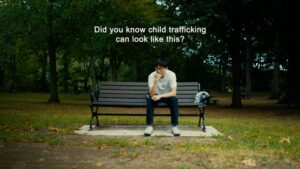Content Warning: This article contains a story of sexual assault.
Our inability as a society to see and believe men and boys can be sexually victimized is troubling. A story in the news this week is a reminder that men and boys are being victimized. And they are also being ignored and dismissed far too often. This week, professional hockey player, Kyle Beach spoke publicly about sexual assault allegations against a coach from the Chicago Blackhawks, Brad Aldrich.
An interview that went live this week with TSN’s Rick Westhead, who aided an investigation into Kyle Beach’s allegations more than a decade ago.
What happened?
In 2010, Kyle complained to the team’s management that a coach had sexually assaulted him. He claimed the coach had threatened his place on the team. In this interview, Kyle Beach shared through tears, “To be honest, I was scared mostly. I was fearful. I had my career threatened. I felt alone and dark…I felt like there was nothing I could do and no one I could turn to for help. And I didn’t know what to do because as a 20-year-old, you can never imagine being put in this situation by someone who is there to help you… just scared and alone with no idea what to do.”
His allegations weren’t taken seriously by the team. The coach, Brad Aldrich, remained on the team for many months in order to avoid disruption or bad publicity. When Blackhawks HR did address it, it was simply giving the accused abuser a chance to resign to avoid investigation. He resigned –– with severance and a bonus. 3 years later, Aldrich was arrested and pleaded guilty to fourth-degree criminal sexual conduct for sexually assaulting a 16-year-old boy.
Why does this matter for an organization addressing child trafficking?
We have a problem as a society not being able to see, believe, or investigate the reality that boys are victimized. And it’s a pervasive issue, impacting many fields, including trafficking. Data from International Labour Organisation (ILO) is the most comprehensive global trafficking research we have. The ILO’s 2017 report claims about sex trafficking that “the vast majority of victims (99 percent) were women and girls.” Common sense (and some intellectual bravery) tells us clearly that this can’t be the whole truth. Men and boys are being sexually victimized, too.
In contrast to the ILO’s suggestion that 1% of sex traffickingvictims are men and boys, 2016 research in the United States from the Center for Court Innovation indicates that “boys make up about 36% of child trafficking victims caught up in the U.S. sex industry.” The researchers found in their interview participants “significant gender diversity, with 60% cis female, 36% cis male, 4% trans female, and less than 1% trans male.”
The inability of service providers and society in general to identify male victims of commercial sexual exploitation stems from a cultural inability to view males as individuals who can experience vulnerabilities. When hearing about a boy who was sexually exploited, people ask questions like: Couldn’t you have fought them off? Didn’t you like it? How can a male be raped, anyway? Often, the resulting judgment is that boys aren’t really victims.
Although to be clear it’s not a sex trafficking case, Kyle Beach’s story of being sexually assaulted as a 20-year-old pro hockey player by his coach, and then not being supported or believed, is terrible. It demonstrates that we must continue to challenge society’s response to boys and men who disclose in order to prevent more victimization and ensure victims get help. And his choice to speak about it was courageous and provides boys who’ve been hurt with one more role model who is telling them: What you went through wasn’t okay. You deserve help and to be taken seriously.

 Parenting
Parenting

